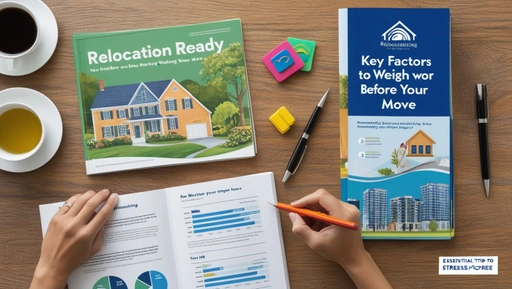
Relocating to a new place is an exciting journey filled with opportunities for fresh beginnings and new experiences. However, the decision to move is not one to be taken lightly. Whether you’re relocating for a job, family, or lifestyle change, careful planning is essential to ensure a smooth transition. Here are key factors to weigh before making the big move.
1. The Cost of Living
One of the most significant considerations when relocating is the cost of living in your new location. Expenses such as housing, groceries, transportation, and healthcare can vary drastically between cities or countries. Researching these costs in advance will help you budget effectively and determine whether your income will support your desired lifestyle. Use online cost-of-living calculators and compare prices to understand what adjustments you might need to make.
2. Job Market and Career Opportunities
If your move isn’t tied to a job transfer or offer, it’s crucial to explore the job market in your new area. Look into industries that are thriving, the demand for your skills, and average salary expectations. Networking through online platforms like LinkedIn or attending local career fairs can provide insights into employment opportunities. A proactive approach can save you from financial stress after relocating.
3. Housing Options
Finding the right place to live is another critical aspect of relocation. Consider factors like proximity to work or schools, safety, and neighborhood amenities. Renting initially can provide flexibility while you get a feel for the area, whereas buying a home might be more cost-effective long-term. Partnering with a reputable real estate agent familiar with the local market can help you secure the best options within your budget.
4. Education and Schools
For families with children, access to quality education is a top priority. Research local schools, their rankings, and the programs they offer. If you’re considering private schools or special education, factor these costs into your budget. Proximity to schools and available extracurricular activities can also play a significant role in your family’s satisfaction with the move.
5. Cultural and Lifestyle Fit
Relocating isn’t just about changing your address—it’s about immersing yourself in a new community and lifestyle. Evaluate the culture, climate, and pace of life in your prospective area. Do you prefer the hustle of an urban environment or the tranquility of a rural setting? Understanding your preferences will help you choose a place that aligns with your values and daily habits.
6. Access to Healthcare
Healthcare access and quality are vital considerations, especially if you or a family member has ongoing medical needs. Research the availability of hospitals, clinics, and specialists in the area. If you’re moving abroad, understand the healthcare system, insurance requirements, and costs to avoid unexpected challenges.
7. Transportation and Commute
Evaluate transportation options in your new location. Will you need a car, or is public transportation readily available? Consider commute times to work or school and the impact on your daily routine. A shorter, stress-free commute can significantly enhance your quality of life.
8. Social and Support Network
Moving to a new place can be isolating without a support system. If you have family or friends nearby, they can ease the transition. If not, look for opportunities to connect with the local community through clubs, sports, or volunteering. Building a network in your new location can make the adjustment period much smoother.
9. Legal and Administrative Preparations
Relocating often involves a series of legal and administrative tasks, such as updating your address, transferring utilities, registering your vehicle, and obtaining new identification. For international moves, ensure your visa, work permits, and documentation are in order. Organizing these details in advance will save you from last-minute complications.
10. Timing Your Move
Timing can significantly impact the cost and convenience of your relocation. Moving during peak seasons, such as summer, can be more expensive and hectic due to high demand for movers. Off-season moves, on the other hand, often come with lower costs and greater availability. Plan your move around favorable weather conditions to avoid disruptions.
11. Emotional Readiness
Relocating can be a rollercoaster of emotions, especially if you’re leaving behind familiar surroundings and loved ones. Take time to process your feelings and prepare for the challenges of adapting to a new environment. Keeping a positive mindset and focusing on the opportunities ahead can make the transition easier.
12. Budgeting for the Move
Relocation expenses can add up rapidly, from hiring movers and covering transportation to setting up utilities and furnishing your new home. To stay on top of costs, create a comprehensive budget that includes these essentials and consider setting aside an emergency fund for unexpected expenses. If you’re in Utah, exploring options like online loans can provide financial flexibility to manage relocation costs more effectively. Being well-prepared financially will help reduce stress and ensure a smoother transition to your new home.
In Conclusion
Relocating is a significant life change that requires thoughtful planning and consideration. By weighing these key factors and preparing for potential challenges, you can turn your move into a rewarding and fulfilling experience. Remember, the key to a successful relocation is balancing practical needs with personal aspirations, ensuring your new destination truly feels like home.
With the right approach, your relocation can be the start of an exciting new chapter. So, take a deep breath, plan carefully, and embrace the journey ahead!


